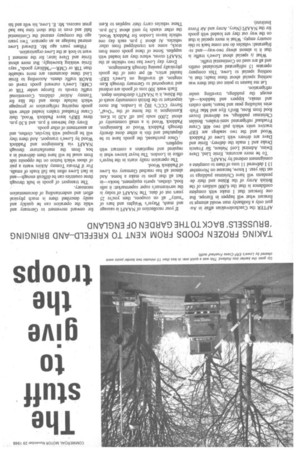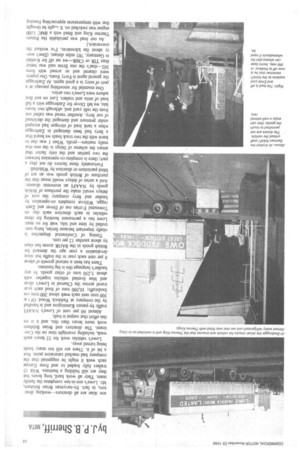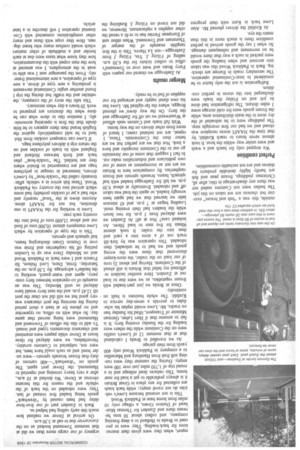The stuff to give the troops
Page 54

Page 55

Page 56

If you've noticed an error in this article please click here to report it so we can fix it.
byJ. P. B. Sherriff, MITA
TAKING FROZEN FOODS FROM KENT TO KREFELD-AND BRINGING 'BRUSSELS' BACK TOTHE GARDEN OF ENGLAND
AFTER the Czechoslovakian affair in Au- gust only a foolhardy man would attempt to forecast what will happen in Europe. But one forecast that I make with complete confidence is that the 6,000 soldiers of the British Army of the Rhine and their dependants will have Christmas puddings to eat this year. I know, because on November 13 I delivered 11 tons of them to complete a consignment ordered by NAAFI.
To be more accurate, Ernie Lind, Dave EWif1S, Admiral Lord Nelson, Sir Francis
Drake and I made the delivery. Ernie and Dave are drivers with Lowe of Paddock Wood and the two seadogs are ERF tractive units which pull two 40ft Crane Fruehauf refrigerated semi-trailers. Besides Christmas puddings, we delivered frozen food from Ross, Bird's Eye and Mac Fisheries including peas and beans, lamb cutlets and steaks, kippers and haddock—all, except the puddings, travelling under refrigeration.
Let me hasten to point out that there was nothing special about these loads; that is, nothing special to Lowe. This company operates 15 refrigerated articulated outfits and all are used on Continental traffic.
What is special about Lowe's traffic is that it is almost alway two-way—and refrigerated: vehicles do not come back to this
country empty. What is more special is that on the way out they are loaded with goods for the NAAFI (Navy, Army and Air Force Institute). If your recollection of NAAFI is sausage and mash, Player's Weights and bars of "nutty" all on coupons, then you're 25 years out of date. The NAAFI of today is the serviceman's super supermarket: it sells food, clothes, sports equipment, books—in fact all that goes to make a home. And almost all has reached Germany via Lowe of Paddock Wood.
The operation really starts in the buyer's office in London. The buyer knows what is required and negotiates a contract with suppliers.
Once purchased, the goods have to be dispatched and this is either done directly through Paddock Wood or Kennington. Paddock Wood is a small community, of about 2,000 souls just off A20 in Kent. Kennington is the home of the "Oval". Surrey CCC's HQ in London. But more important to the British community south of the Rhine, it is NAAFI's distribution depot.
Each week 300 tons of goods are ordered and transported to Germany through Ken nington, all travelling on Lowe's ERFhauled artics, 40 per cent of the goods physically passing through Kennington.
Every day Lowe has two vehicles at the NAAFI stores, where they are loaded with supplies. Some of these goods come from stock, some are transhipped from other vehicles. At about 3 p.m. each day one vehicle leaves London for Paddock Wood, the other stands by until about 5.30 p.m. These vehicles carry their supplies to Kent for onward movement to Germany and while the operation can be quickly and easily described there is much physical effort and understanding of documentation necessary.
The transport of goods in bulk through three countries can be difficult enough—and in fact Lowe often has full loads of smalls. For if Private Tommy Atkins wants a pair of shoes which button on the opposite side from usual he will have them delivered in a box from the manufacturer through NAAFI via Kennington and Paddock Wood by Lowe's transport. And there they will be grouped with bicycles, clothes, and an assortment of other goods.
Every day between 8 p.m. and 8.30 p.m. three ERFs leave Paddock Wood, their Crane Fruehauf trailers loaded either with goods requiring refrigeration or groupage which include shoes and the like for Tommy Atkins' children. Conventional traffic travels to Europe under TIR or CMR; Lowe's outward goods travel on BAOR traffic sheets. According to Ernie Lind these documents are more valuable than T1R or CMR—"Military goods," says Ernie winking knowingly. But more about Ernie and Dave later; for the moment I want to look at the Lowe organization.
Fifteen years ago Mr. Edward Lowe entered haulage as an operator. Two years ago the company entered the Continental field and even in that short time has had great success. Mr. E. Lowe, his wife and his son Alan are all directors—working directors, in fact. Ex-navyman Brian Belsham, Mr. Lowe's son-in-law completes the family team. They all work hard, long hours but they are still building a business. With 15 trailers fully loaded to and from Europe each week it might be suggested that the company had reached saturation point. Not a bit of it. There are still too many loads being turned away.
Lowe's vehicles work for 52 hours each week, including overnight time on the Continent. The directors and Brian Bels ham work more hours than this, and it is on this effort that output is built.
Almost 60 per cent of Lowe's NAAFI traffic by-passes Kennington and is handled by the company at Paddock Wood. Oft 300 tons sent each week about 200 tons z re foodstuffs; 10,500 tons of food each year travel across the Channel in Lowe's silver and blue liveried vehicles together with about 5,250 tons of other goods. In any haulier's language this is big business.
There has been a natural growth of about 8 per cent each year in the traffic but since devaluation a year ago the demand for British goods in the BAOR stores has risen by about another 12 per cent.
Timing of Continental dispatches is vitally important because ferries, being controlled by time and tide, wait for no man. Lowe has a permanent booking for three vehicles in each direction each day on Townsend Ferries out of Dover and Zeebrugge. Without complete co-operation by haulier and ferry company the cost of delays would make the purchase of British goods by NAAFI an economic disaster. And a series of delays would mean that the purchase of British goods was an act of blind patriotism or direction by Whitehall.
Fortunately these factors do not play a part; there is complete co-operation between the two parties and the only factor that enters the scheme of things is the one that really matters—profit. When I was due to leave with the two truck loads we heard that a ferry had been damaged in Zeebrugge when a tank load of nitrogen had escaped under pressure and damaged the deckhead of our ferry_ Another vessel was called out from the refit yard and, although two hours late, we left Dover for Zeebrugge with a full load of units and trailers. Last on and first ashore were Lowe's two artics.
One essential for smoothing passage at a port of entry is a good agent. At Zeebrugge the general agent is Ferry Boats. Our papers were cleared and so armed with form 302—that's the one Ernie said was better than TIR or CMR—we set oil' for KrefeEd in Germany, 785 miles distant. (Don't worry about the kilometres, I've worked the conversion.) As our load was perishable the Petters Thermo King unit fitted with a BMC 1100 engine was switched on. It .1..ight be thought that with temperatures approaching freezing
outside, this was a "belt and braces" exercise but chances are not taken on this job. The bodies were not Customs sealed nor was there any disadvantage in this; after all, Christmas puddings, frozen peas and fish are hardly highly desirable products for thieves and are not excisable commodities.
Perfect condition We stopped only for lunch and a wash and were under way within the hour. It took almost seven hours to reach Krefeld; by that time the NAAFI stores reception was closed and we had our first overnight stop. The puddings were to be unloaded af the dry store in the main distribution area, while the frozen goods were for cold storage some 3 miles distant. The refrigeration had done its job and on Friday the loads were discharged into the stores in perfect condition.
Refrigeration is not the only factor to be considered in inter-Continental operation. The secondary roads in Europe are shocking. Back in Paddock Wood this was taken into account and when loading the goods were packed in such a way that there would be no movement and subsequent damage. So when I say the goods arrived in perfect condition there is much more in this than meets the eye.
At Krefeld the drivers phoned Mr. Alan Lowe back in Kent with their progress report, when they were given their instructions for back-loading. They were to proceed to Breda in Holland to a deep freezing company, and collect about 30 tons 'between there and Zundert for Thomas Muirhead of Dunton Green, a village only 10 miles from home base at Paddock Wood.
This is not unusual because Lowe's vehicles do not travel empty; while back loads are collected for any place in Great Britain it is always preferable to get a load for near home. This reduces dead mileage and in a round trip of 1,750 miles just over 100 were empty. During the summer they were running soft fruit from Hamburg and Marseilles to a company in Paddock Wood only 400 yards from their garage.
As we travelled to Breda I calculated that at that moment 12 of Lowe's outfits were on the Continent while the others were loading for the Sunday evening ferry. It is fair to assume that if Herr Leber, German Minister of Transport, lifted his Sunday ban on trucks, Mr. Lowe would replan his schedules to provide a seven-day service to Krefeld. The whole business is built on continuity.
Once at Breda we just part-loaded with frozen vegetables, as we were due to load out at Zundert. Here another incident reaffirmed my belief that Britain is still ahead of the Continent. Having put about 24tons of our load on the trailer, the store-keeper discovered that these were the wrong goods and we had to be unloaded, then reloaded. This operation was by fork-lift truck out of a store into a yard and then into the trailer. It took almost 90min for five men to load 50cwt. An isolated case? Not at all! At Zundert we were delayed from 5 p.m. for two hours while the loaders had their evening meal. Loading began at 7 p.m. and 45 minutes later we learned that we had again been wrongly loaded, so again the load was taken off and reloaded. Eventually at about 9.30 p.m. we left for Zeebrugge loaded with leaf spinach, beans, brussels sprouts and frozen raspberries. By comparison here in Britain we are not as incompetent as some of our own politicians and industrialists make out. In fact I suggest that some of our Jeremialts go out to the Continent incognito and have a look. Not that we are perfect but we are better than the Continentals. These, I repeat, are not isolated cases; I heard of more from other drivers on the way home.
With full loads and Custom seals affixed at Wuustwezel we set off for Zeebrugge and the ferry. On the way down" we phoned Brugge, where the far-sighted Mr. Lowe has his own diesel supply and arranged for our supplies of fuel to be ready.
Merger results At Zeebrugge we cleared our papers with Ferry Boats and went over to Townsend's office to collect tickets for the 6.30 a.m. sailing of Viking 3. Yes, Viking 3 from Zeebrugge—not Le Havre. This is the first tangible example of the merger of Thorensen and Townsend. When either unit of European Ferries has to re-fit a vessel the other supplies a replacement. However, we did not travel on Viking 3. Realizing the urgency of our cargo more than we did at that moment Townsend booked us on the A utocarrier due to sail at 3.30 a.m.
On arrival at Dover we realized how much this early sailing had helped us.
Back in Zundert part of our four-hour delay had been caused by "drawback" goods being loaded first instead of last. They were reloaded on the back of the vehicle and the reason for this became obvious at Dover. We docked at 10 a.m., after a very heavy crossing and reported to Hammond, the Dover port agent. The goods on "drawback"-400 cartons of duty-free frozen brussels sprouts—were under bond and as such could have been, but were not, subjected to Customs scrutiny. Nevertheless, we were delayed for three hours at Dover while papers were examined and clearance documents typed and issued. To add to this the offices of Townsend and Hammond were being moved that same day. So what with no office, no typewriter and no phone for at least a short period during the morning the port clearance was very good but we still did not clear the port till 12.45 p.m. and the next ferry would have delayed us until Monday. This was an example of co-operation between ferry company, agent and water-guard, working to the haulier's advantage. By 3.30 p.m. on the Saturday, Ernie, Dave, Lord Nelson, Sir Francis and I were back in Paddock Wood and on Monday Dave was up in London putting off his raspberries and Ernie was over in Dunton Green discharging beans, leaf spinach and sprouts.
This is the type of operation by which Lowe transports almost 10,500 tons of food out and about 15,600 tons of food into the country each year.
Lowe is working for the NAAFI in one direction, but not for NAAFI alone. Anyone down at the "local" recently and who had a jar of cockles probably had some which arrived into the country via Paddock Wood. These fish arrive in a vehicle, affectionately called the "cockle-boat" by Lowe's drivers, immersed in vinegar in polythene bags and are transported to Bristol where they are bottled. The "cockle-boat" plies back and forth between Holland and England with its loads of cockles and on the return trip it delivers polythene bags.
If Lowe can transport cockles from Holland to be sold competitively against the English brand then there appears to be little doubt that the firm is operating economically. I mention this to show what can be done when the directors are prepared to work 20 hours a day when necessary.
This tells the story of the company, the vehicles and the traffic but during the trip I found another angle: Continental movement is producing a new type of driver, a new type of operation, a new international fraternity. From the passenger seat I was able to soak in the atmosphere. I was amazed at how the men coped with the documentation, how they knew what taxes were due at each border and a multitude of other matters which would confuse many who boast degrees. How they cope with these and many other complications connected with Continental operation I will describe in a later article.




















































































































